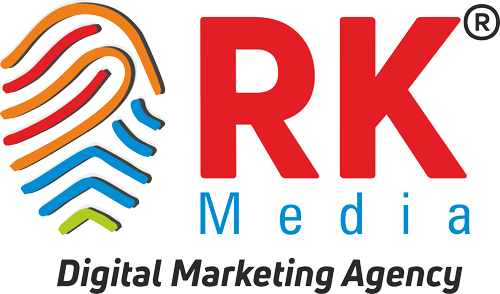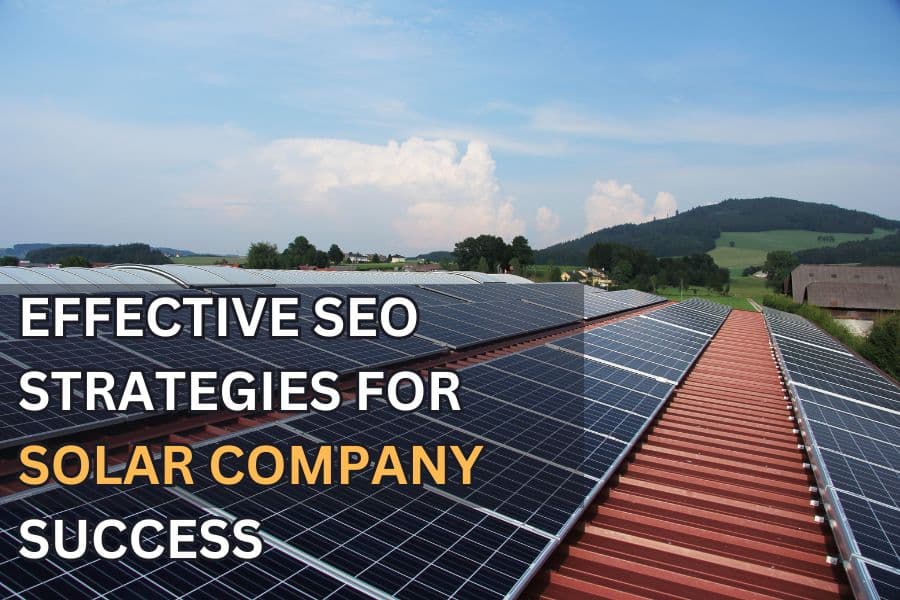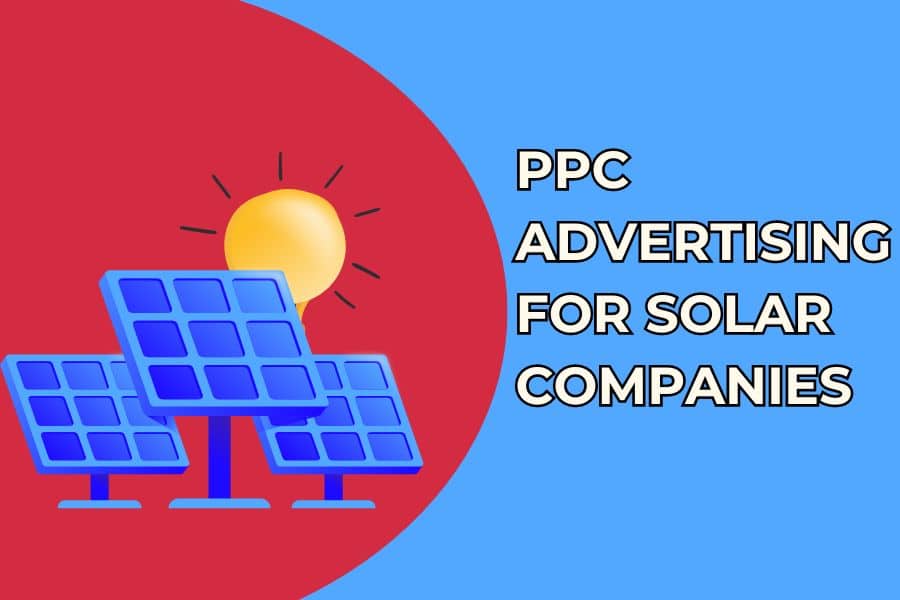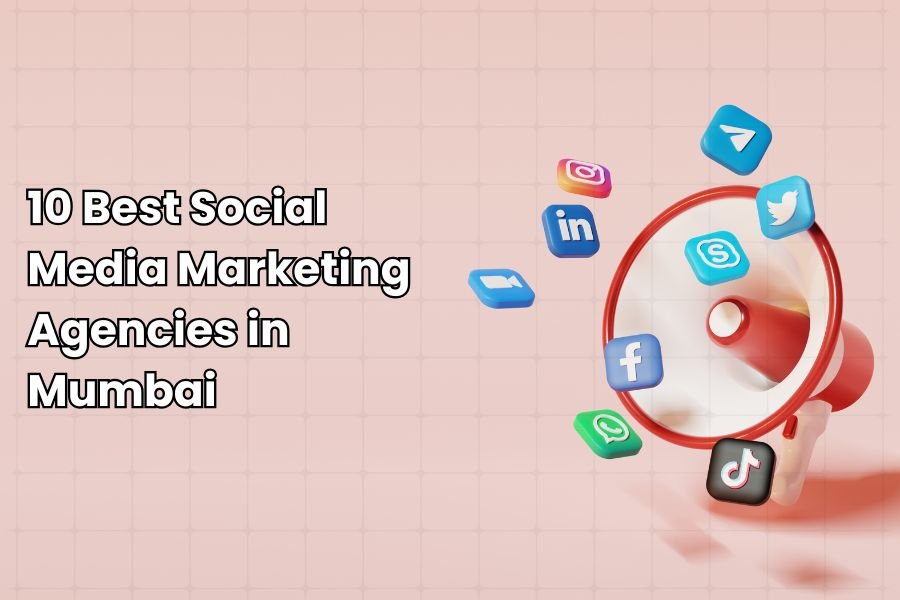Digital Marketing Strategies for Solar Company: A Comprehensive Guide
As renewable energy solutions become increasingly popular, solar companies face a competitive market. To stand out and grow, these companies need effective strategies. Digital marketing has become a crucial tool, offering innovative ways to connect with potential customers, inform them about the benefits of solar energy, and convert leads into loyal clients. This guide explores essential digital marketing strategies tailored for the solar industry, helping companies leverage online platforms to expand their reach and impact.
Importance of Digital Marketing in the Solar Industry
The solar industry is growing rapidly as more consumers and businesses seek sustainable energy solutions. However, this growth also brings increased competition. Traditional marketing methods alone are no longer enough to stand out. Digital marketing provides a dynamic and cost-effective way for solar companies to engage with their target audience, build brand awareness, and drive sales.
Digital marketing uses various online channels such as search engines, social media, email, and content marketing to reach and interact with consumers. These channels allow solar companies to present their value propositions directly to people actively looking for information about solar energy solutions. By using data-driven strategies, companies can personalize their marketing efforts, ensuring their messages resonate with the right audience at the right time.
Key Digital Marketing Strategies for Solar Companies
To effectively market solar energy solutions in the digital age, solar companies must implement a multifaceted approach designed to attract, engage, and convert potential customers. Here are some key strategies that form the backbone of successful digital marketing efforts for solar businesses:
Search Engine Optimization (SEO)
SEO is essential for enhancing the visibility of your solar company’s website on search engine results pages (SERPs). By optimizing your website content for relevant keywords and improving various on-page and off-page elements, you can ensure that potential customers find your business when they search for solar energy solutions. This involves keyword research, optimizing meta tags, creating high-quality content, and building backlinks.
Pay-Per-Click (PPC) Advertising
PPC advertising allows you to drive immediate traffic to your website by placing paid ads in search engine results for targeted keywords. This ensures that your company appears prominently when potential customers search for solar-related terms. Through careful keyword selection and budget management, PPC can deliver quick results and a high return on investment.
Content Marketing
Creating and sharing valuable, informative content is a powerful way to educate consumers about solar energy, address their questions and concerns, and establish your company as an industry authority. This strategy includes writing blog posts, producing videos, creating infographics, and publishing whitepapers. Effective content marketing helps build trust and encourages potential customers to engage with your brand.
Social Media Marketing
Leveraging social media platforms such as Facebook, Twitter, LinkedIn, and Instagram is crucial for building a community around your brand, engaging with followers, and promoting your solar products and services. Regular updates, customer interactions, and targeted advertising on these platforms can significantly increase your reach and influence.
Email Marketing
Email marketing remains a highly effective way to nurture leads and maintain relationships with existing customers. By sending targeted email campaigns that include updates, special offers, educational content, and personalized messages, you can keep your audience informed and engaged, leading to higher conversion rates.
Local SEO
For solar companies that operate within specific geographic regions, local SEO is vital. This involves optimizing your online presence to attract customers from targeted local areas. Strategies include claiming and optimizing your Google My Business listing, gathering positive local reviews, and creating locally relevant content. Local SEO helps ensure that your business appears in local search results and maps.
Online Reputation Management
Managing your online reputation is crucial for building trust and credibility with potential customers. This includes monitoring and responding to reviews on platforms like Google, Yelp, and industry-specific sites. Proactively managing your online reviews and ratings can enhance your company’s image and reassure potential customers of your reliability.
Web Design and User Experience (UX)
A well-designed website that offers a seamless user experience is fundamental for converting visitors into leads and customers. Your website should be mobile-responsive, easy to navigate, and designed with clear calls to action. Ensuring that your website is visually appealing and user-friendly can significantly impact your conversion rates and overall customer satisfaction.
Social Media Marketing for Solar Company
Importance of Social Media Marketing
Social media marketing is a powerful tool for all businesses, including those in the solar energy industry. With millions of people using platforms like Facebook, Instagram, Twitter, and LinkedIn, solar companies can use social media to increase their brand visibility, build relationships with customers, and generate leads. Here is why social media marketing is important for solar companies:
A. Increased Brand Awareness and Engagement:
- Social media platforms have a vast reach, allowing solar companies to showcase their products and services to a large audience. By regularly posting informative and engaging content, companies can increase their visibility and become a well-known name in the industry.
- Engaging with users through likes, shares, comments, and direct messages helps create a community around the brand. This interaction not only fosters brand loyalty but also provides valuable feedback and insights from customers.
B. Benefits of Social Media Marketing for Solar Companies:
- Cost-Effective Advertising: Social media marketing is usually more affordable than traditional marketing methods. Paid ads on social media can be highly targeted, ensuring that marketing budgets are used effectively.
- Enhanced Customer Trust and Credibility: Sharing testimonials, case studies, and customer reviews helps build trust and credibility. Positive interactions and transparency on social media can improve a company’s reputation.
- SEO Benefits: Active social media profiles can boost search engine rankings. Sharing blog posts, articles, and other content on social media drives traffic to the company’s website, which can positively affect SEO.
- Real-Time Customer Support: Social media allows companies to provide immediate support and responses to customer inquiries. This quick service enhances customer satisfaction and can lead to higher conversion rates.
Social Media Marketing Strategies for a Solar Company
Developing a robust social media presence for a solar company goes beyond merely posting regularly. It’s about creating meaningful content that resonates with the audience and implementing strategies to grow and engage followers effectively. Here are some specific content ideas and strategic approaches tailored for the solar industry:
A. Content Ideas Tailored for the Solar Industry
Educational Posts: Share informative content that educates the audience about solar energy, its numerous benefits, and its positive environmental impact. Use a variety of formats such as infographics, short videos, and well-crafted articles to make complex information accessible and engaging for your audience.
Customer Testimonials and Success Stories: Highlight your satisfied customers and showcase successful solar installations. Utilize before-and-after photos, video testimonials, and detailed case studies to vividly demonstrate the effectiveness and benefits of your solar solutions. These real-life examples can build trust and credibility.
Behind-the-Scenes Content: Offer a peek into the daily operations of your company, introduce team members, and show the installation processes. This type of content humanizes your brand, fostering a personal connection with your audience and making your company more relatable.
Industry News and Updates: Stay on top of the latest news, trends, and technological advancements in the solar industry and share these updates with your audience. By doing so, you position your company as an authoritative and knowledgeable source, keeping your followers informed and engaged.
Sustainability Tips: Provide practical advice on living a more sustainable lifestyle. This content aligns with the values and interests of potential customers who are inclined towards solar energy, enhancing your brand’s relevance and appeal.
Interactive Content: Engage your audience with interactive content such as polls, quizzes, and contests. For example, a quiz that calculates potential savings from switching to solar can be both entertaining and informative, encouraging interaction and sharing.
B. Strategies for Engaging and Growing a Social Media Audience
Consistent Posting Schedule: Develop a content calendar to ensure your posts are regular and timely. Consistency is key to maintaining audience interest and engagement, helping you build a loyal follower base.
Utilize Hashtags: Incorporate relevant hashtags to increase the visibility of your posts. Conduct research to identify popular and trending hashtags within the solar industry to reach a broader audience and enhance discoverability.
Engage with Followers: Actively respond to comments, messages, and mentions. Engaging in conversations and acknowledging feedback helps build a strong community around your brand, showing that you value and listen to your audience.
Collaborate with Influencers: Partner with influencers or industry experts who have a significant following. Influencer endorsements can significantly boost your credibility and expand your reach, introducing your brand to new and larger audiences.
Paid Social Media Campaigns: Invest in targeted advertising to reach specific demographics that align with your ideal customer profile. Utilize the insights and analytics provided by social media platforms to refine and optimize your ad campaigns, ensuring they are effective and cost-efficient.
Monitor and Analyze Performance: Use social media analytics tools to track key metrics such as engagement, reach, and follower growth. Regularly analyze this data to understand what types of content resonate most with your audience. Adjust your strategies accordingly to continuously improve your social media performance.
Search Engine Optimization (SEO) for Solar Companies
Importance of SEO
Search Engine Optimization (SEO) is the practice of improving a website’s visibility on search engines like Google, Bing, and Yahoo. This involves optimizing various parts of your website to ensure it ranks higher in search results for relevant queries. SEO is important because it drives organic, non-paid traffic to your website, which can lead to higher conversion rates and increased brand visibility.
For a solar company, SEO is particularly crucial due to the competitive nature of the renewable energy market. Many potential customers begin their search online, looking for information about solar energy benefits, installation costs, and local providers. By optimizing your website for search engines, your solar company can appear prominently when potential customers search for these topics, significantly increasing your chances of attracting and converting visitors into customers.
Benefits of SEO for Solar Companies
- Increased Website Traffic: Higher search engine rankings lead to more visibility and clicks, driving more visitors to your site.
- Enhanced Credibility and Trust: Websites that appear at the top of search results are often seen as more credible and trustworthy by users.
- Cost-Effective Marketing: Unlike paid advertising, organic traffic generated through SEO is free, providing a higher return on investment over time.
- Targeted Audience Reach: SEO allows you to target specific keywords and phrases that your potential customers are using, ensuring you attract a relevant audience.
- Long-Term Results: While SEO requires ongoing effort, its benefits are long-lasting, providing sustained traffic and visibility.
SEO Ideas for Solar Companies
Keyword Research and On-Page SEO Techniques
Keyword Research
- Identify Relevant Keywords: Begin by identifying keywords that are directly related to solar energy. Examples include “solar panel installation,” “benefits of solar energy,” and “top solar companies near me.” Utilize tools such as Google Keyword Planner, SEMrush, or Ahrefs to find keywords that have high search volumes but relatively low competition.
- Focus on Long-Tail Keywords: Long-tail keywords are more specific and often less competitive, making them easier to rank for. Examples might include “residential solar panel installation in [city]” or “cost of solar panels for small businesses.” These keywords are more likely to attract targeted traffic.
- Local SEO Keywords: Many solar companies operate within specific regions. To attract local customers, incorporate location-based keywords such as “solar installers in [city]” or “solar energy solutions in [state].” This helps your site appear in local search results.
On-Page SEO
- Title Tags and Meta Descriptions: Each page of your website should have a unique title tag and meta description that includes your target keywords. This practice helps search engines understand your content and improves click-through rates from search engine results pages (SERPs).
- Header Tags (H1, H2, H3): Use header tags to structure your content effectively. Including keywords in these headers can enhance both readability and SEO.
- Keyword Placement: Naturally integrate keywords throughout your content, especially in the first 100 words, in headers, and consistently throughout the body text. Be careful to avoid keyword stuffing, as it can negatively impact your rankings.
- Internal Linking: Use internal links to connect to other relevant pages on your website. This practice helps search engines understand the structure of your site and distributes link equity among your pages.
Link-Building Strategies and Content Optimization for Solar Companies
Link-Building Strategies
- Guest Blogging: Write articles for reputable blogs and websites within the renewable energy sector. By including links back to your site, you can build authority and drive traffic.
- Local Business Listings: Ensure your company is listed in local business directories such as Google My Business, Yelp, and Yellow Pages. These listings typically include a backlink to your website, which can improve your site’s authority.
- Partnerships and Collaborations: Partner with other businesses and organizations in the solar industry to exchange backlinks. This can include suppliers, industry associations, and local environmental groups.
- Social Media Sharing: Share your content on social media platforms to increase visibility. High-quality content is more likely to be shared and linked to by others.
Content Optimization
- Educational Blog Posts: Create blog posts that educate readers about solar energy benefits, installation processes, maintenance tips, and industry news. High-quality, informative content is likely to attract backlinks and engage readers.
- Case Studies and Testimonials: Publish case studies and customer testimonials that highlight successful solar panel installations. This type of content can build trust and encourage other websites to link to your success stories.
- Video Content: Produce videos that explain how solar panels work, and the benefits of solar energy, and include customer testimonials. Videos are highly engaging and can significantly improve your website’s SEO.
- Infographics and Visual Content: Develop infographics that present key statistics and benefits of solar energy in a visually appealing way. Visual content tends to be shared and linked to more frequently than text-based content.
- Regular Updates: Keep your content current by updating it with the latest industry trends, news, and technological advancements in solar energy. Fresh content signals to search engines that your site is active and relevant, which can improve your rankings.
PPC Advertising for Solar Companies
Understanding PPC Advertising and Its Advantages
Pay-per-click (PPC) advertising is a digital marketing strategy where you pay a fee each time someone clicks on your ad. It is essentially a way to buy visits to your website rather than trying to get them organically. For solar companies, PPC advertising offers a powerful way to reach a specific audience that is actively looking for solar solutions. The main platforms for PPC are Google Ads, Bing Ads, and social media networks like Facebook, LinkedIn, and Instagram.
Advantages of PPC Advertising
Immediate Visibility: Pay-Per-Click (PPC) advertising provides your solar company with immediate exposure on major search engines and social media platforms. This means that your business can be seen by potential customers almost instantly after your ads go live, ensuring you can start attracting attention right away.
Targeted Reach: PPC allows you to meticulously target your advertisements based on various criteria such as keywords, geographic location, demographics, and even user behaviour. This precision targeting ensures that your ads are shown to the most relevant audience, increasing the likelihood of engaging potential customers who are interested in solar energy solutions.
Cost-Effectiveness: One of the most appealing aspects of PPC advertising is its cost-efficiency. You only incur costs when someone clicks on your ad, which means your budget is spent on generating actual interest and potential leads rather than simply on ad impressions.
Measurable ROI: PPC platforms offer comprehensive analytics tools that provide detailed insights into your ad performance. This data allows you to track key metrics and measure the effectiveness of your campaigns, making it easier to calculate your return on investment (ROI) and adjust your strategies for optimal results.
Brand Awareness: Even if users don’t click on your ads, having them prominently displayed at the top of search results can significantly boost your brand’s visibility and recognition. Over time, this increased exposure can enhance brand awareness and keep your company top-of-mind for potential customers.
How PPC Can Generate Leads and Drive Traffic for Solar Companies
PPC advertising can be a game-changer for solar companies by effectively connecting them with consumers who are actively seeking renewable energy solutions. Here are some ways in which PPC can aid in lead generation and traffic driving:
Lead Generation: By targeting high-intent keywords like “solar panel installation,” “residential solar systems,” or “solar energy companies,” PPC ads attract potential customers who are likely to be ready to make a purchase or inquire about services. These keywords ensure that your ads are seen by users with a clear interest in solar energy solutions.
Driving Traffic: Well-crafted PPC ads can significantly boost traffic to your website. This influx of visitors allows you to showcase your products, services, and unique selling points, thereby increasing the chances of converting visitors into leads or customers.
Local Targeting: Solar companies often operate within specific geographic regions. PPC campaigns can be geographically targeted to ensure that your ads are seen by individuals within your service area, maximizing the relevance and effectiveness of your advertising efforts.
Retargeting Opportunities: PPC platforms offer retargeting options that enable you to reach out to users who have previously visited your website but did not convert. By re-engaging these visitors with tailored ads, you can encourage them to return and complete their inquiry or purchase.
Strategies for Effective PPC Campaigns
Creating Compelling Ad Copy and Selecting Keywords
Ad Copy:
- Highlight Benefits: Emphasize the key benefits of solar energy, such as cost savings, positive environmental impact, and energy independence. This can attract attention and resonate with potential customers.
- Use Strong CTAs: Incorporate clear and compelling calls to action (CTAs) like “Get a Free Quote,” “Schedule a Consultation,” or “Learn More.” These prompts encourage users to take the next step.
- Incorporate Keywords: Naturally integrate relevant keywords into your ad copy to improve relevance and enhance your Quality Score, which can lead to better ad placement and lower costs.
- Include Unique Selling Points (USPs): Highlight what makes your solar company stand out, such as your industry experience, special offers, certifications, or exceptional customer service.
Keyword Selection:
- Research Keywords: Utilize tools like Google Keyword Planner to identify high-traffic, relevant keywords related to solar energy. This research helps in targeting terms that potential customers are actively searching for.
- Long-Tail Keywords: Focus on long-tail keywords (e.g., “best residential solar panel installers near me”) to attract more qualified leads. These specific phrases often indicate a higher intent to purchase.
- Negative Keywords: Implement negative keywords to exclude irrelevant traffic. This practice ensures that your ads are only shown to users who are likely to be interested in your offerings.
- Competitor Analysis: Analyze the keywords your competitors are using to discover opportunities and gaps in your own strategy, helping you refine your targeting and stay competitive.
Budget Management and Performance Tracking for PPC Campaigns
Budget Management:
- Set a Daily Budget: Establish a daily budget based on your overall marketing goals and financial capabilities. This helps manage your spending and ensures that your campaigns run consistently.
- Bid Strategies: Choose an appropriate bid strategy, such as manual CPC for more control over individual bids, or automated strategies like Target CPA for efficiency and cost-effectiveness.
- Monitor and Adjust: Regularly monitor your campaign performance and adjust bids as needed to maintain optimal performance without overspending. Flexibility and responsiveness are key to effective budget management.
Performance Tracking:
- Conversion Tracking: Implement conversion tracking to measure specific actions taken by users, such as form submissions, phone calls, or purchases directly attributed to your ads. This data is crucial for assessing the success of your campaigns.
- Analytics Tools: Utilize Google Analytics and PPC platform analytics to gain deeper insights into your campaign performance and user behavior. These tools provide valuable data that can inform your optimization efforts.
- Key Metrics: Track essential metrics such as click-through rate (CTR), cost per click (CPC), conversion rate, and return on ad spend (ROAS). These metrics help gauge the effectiveness of your campaigns and identify areas for improvement.
- A/B Testing: Conduct A/B tests on different elements of your campaigns, such as ad copy, landing pages, and keywords. Continuous testing and refinement enable you to enhance the performance of your PPC efforts over time.
Digital Marketing Plan and Strategy for Solar Company
Digital marketing is essential for solar companies aiming to grow their presence and influence in a competitive market. A well-thought-out digital marketing plan can help attract more customers, boost sales, and increase brand awareness. This guide will walk you through creating a comprehensive digital marketing plan, implementing strategies effectively, and monitoring progress to ensure the best results.
Developing a Comprehensive Plan
Steps to Create a Tailored Digital Marketing Plan for a Solar Company
- Conduct Market Research: Start by understanding your market. Identify your target audience, their demographics, and preferences. Analyze the competition to see what strategies they use and identify gaps you can fill.
- Define Objectives and Goals: Set clear, measurable objectives that align with your business goals. These might include increasing website traffic, generating leads, improving brand awareness, or boosting sales. Use the SMART criteria (Specific, Measurable, Achievable, Relevant, Time-bound) to define your goals.
- Identify Key Marketing Channels: Determine which digital channels will be most effective for reaching your audience. Common channels include search engine optimization (SEO), pay-per-click (PPC) advertising, social media, email marketing, and content marketing.
- Create Buyer Personas: Develop detailed profiles of your ideal customers. Include information such as age, gender, location, income level, interests, and pain points. This will help tailor your marketing messages to resonate with your target audience.
- Develop a Content Strategy: Content is crucial in digital marketing. Create a content calendar that includes blog posts, infographics, videos, case studies, and other content types that address your audience’s needs and showcase the benefits of your solar products.
- Set a Budget: Allocate your budget across different marketing channels based on their potential return on investment (ROI). Consider the cost of tools, advertising, content creation, and personnel.
- Choose the Right Tools: Use digital marketing tools for analytics, SEO, social media management, email marketing, and more. Tools like Google Analytics, SEMrush, Hootsuite, and Mailchimp can streamline your efforts and provide valuable insights.
Importance of Market Research and Setting Objectives
Market research is the foundation of any successful digital marketing plan. It helps you understand the competitive landscape, identify opportunities, and avoid costly mistakes. By setting clear objectives, you can focus your efforts and resources on activities that will drive the most significant impact.
Monitoring and Adjusting Strategies for Optimal Results
To achieve optimal results, it is essential to continuously monitor and adjust marketing strategies. This involves several key practices:
- Track Key Metrics: Utilize analytics tools to monitor key performance indicators (KPIs) such as website traffic, conversion rates, click-through rates, and return on investment (ROI). Regularly reviewing these metrics provides valuable insights into the effectiveness of your marketing strategies. By keeping a close eye on these indicators, solar companies can identify what is working well and what needs improvement.
- A/B Testing: Conduct A/B testing on various marketing elements, including website components, email campaigns, and advertisements. By testing different versions of headlines, images, calls-to-action, and content formats, companies can determine which variations perform best. A/B testing is a powerful method for optimizing campaigns and enhancing overall performance.
- Adjust and Improve: Based on the data collected from analytics and A/B testing, make data-driven adjustments to your marketing strategies. Continuously refining your approach is crucial for improving performance and achieving your marketing goals. This iterative process helps ensure that strategies remain effective and responsive to changing market conditions.
- Stay Updated: The digital marketing landscape is constantly evolving. To stay ahead, it is important to stay informed about the latest trends, tools, and best practices. Follow industry blogs, attend webinars, and participate in professional networks to keep your knowledge up-to-date. Staying current with industry developments enables solar companies to adapt quickly and leverage new opportunities.
- Customer Feedback: Collect and analyze feedback from customers to gain a deeper understanding of their needs and preferences. This information is invaluable for enhancing products, services, and marketing strategies. By listening to customers and incorporating their feedback, solar companies can improve customer satisfaction and loyalty, ultimately driving better business outcomes.
Digital Marketing Tools for Solar Companies
Overview of Essential Digital Marketing Tools for Solar Companies
Digital marketing is essential for solar companies wanting to expand their reach and attract new customers. The renewable energy market is competitive, so using the right digital marketing tools can make a big difference. These tools help manage various aspects of marketing, from social media engagement and search engine optimization (SEO) to pay-per-click (PPC) campaigns and data analytics. Here is an overview of essential digital marketing tools that solar companies should consider.
Social Media Management Tools
- Hootsuite: Hootsuite is a comprehensive platform that allows solar companies to schedule posts, track performance, and engage with followers across multiple social media channels, such as Facebook, Twitter, LinkedIn, and Instagram. This makes it easier to maintain a consistent online presence.
- Buffer: Buffer helps manage social media accounts with features like post-scheduling, analytics, and team collaboration. Its simplicity and user-friendly interface make it a popular choice for smaller solar companies looking to streamline their social media efforts.
- Sprout Social: Sprout Social offers robust features, including scheduling, monitoring, and reporting. It also provides social listening tools to help solar companies understand customer sentiments and trends, enabling them to tailor their content and campaigns accordingly.
SEO Tools
- Google Analytics: Google Analytics is crucial for any digital marketing strategy. It provides in-depth insights into website traffic, user behavior, and conversion rates. Solar companies can use this data to optimize their website content and improve their SEO efforts.
- SEMrush: SEMrush is a powerful SEO tool offering keyword research, competitive analysis, backlink analysis, and site audits. Solar companies can use SEMrush to identify high-value keywords, monitor their search engine rankings, and find opportunities to outperform competitors.
- Ahrefs: Ahrefs is known for its comprehensive backlink analysis capabilities. It also offers keyword research, site auditing, and competitor analysis. Solar companies can use Ahrefs to enhance their SEO strategy by identifying backlink opportunities and monitoring their SEO performance.
PPC Tools
- Google Ads: Google Ads is the go-to platform for PPC advertising. It allows solar companies to create targeted ad campaigns that appear on Google search results and its network. The platform’s extensive targeting options and detailed analytics enable companies to optimize their ad spend and maximize ROI.
- Microsoft Advertising: Formerly known as Bing Ads, Microsoft Advertising provides an alternative to Google Ads with similar features. It allows solar companies to reach a different audience demographic and can be useful for capturing leads from Bing and Yahoo search engines.
- Facebook Ads Manager: Facebook Ads Manager is essential for running PPC campaigns on Facebook and Instagram. Solar companies can create highly targeted ads based on demographics, interests, and behaviours. The platform also provides robust analytics to track ad performance and optimize campaigns.
Analytics Tools
- Google Data Studio: Google Data Studio is a free data visualization tool that helps solar companies create custom dashboards and reports. It integrates seamlessly with Google Analytics, Google Ads, and other data sources, providing a comprehensive view of marketing performance.
- Tableau: Tableau is a leading data visualization and business intelligence tool. It enables solar companies to analyze large datasets and create interactive, shareable dashboards. Tableau’s advanced analytics capabilities can help companies uncover insights and make data-driven decisions.
- HubSpot: HubSpot offers a suite of marketing, sales, and service tools with robust analytics features. Solar companies can use HubSpot to track the entire customer journey, from initial contact to conversion, and measure the effectiveness of their marketing efforts.
Recommendations for Implementing Digital Marketing Tools
Implementing digital marketing tools effectively requires a strategic approach:
- Assess Your Needs: Start by evaluating your current marketing efforts and identifying areas where digital tools can provide the most value. Consider your goals, target audience, and budget.
- Select the Right Tools: Choose tools that align with your specific needs and objectives. For instance, if your primary focus is on improving SEO, prioritize tools like SEMrush or Ahrefs.
- Integration: Ensure that the tools you select can integrate with each other and your existing systems. This will help streamline your marketing efforts and provide a unified view of your performance.
- Training and Support: Invest in training for your team to ensure they can use the tools effectively. Many tools offer tutorials, webinars, and customer support to help users get the most out of their features.
- Monitor and Optimize: Regularly review the performance data provided by these tools. Use the insights gained to adjust your strategies and improve your campaigns. Continuous optimization is key to maximizing the effectiveness of your digital marketing efforts.
Impact of Digital Marketing on Solar Companies
Digital marketing has transformed how businesses operate, including those in the solar industry. For solar companies, digital marketing offers many advantages that can greatly enhance growth, brand awareness, and customer acquisition. Here, we explore the positive effects of digital marketing on a solar company’s growth and highlight successful campaigns in the solar industry.
Positive Effects of Digital Marketing on a Solar Company’s Growth
- Increased Brand Visibility: Digital marketing helps solar companies increase their visibility on a global scale. With tools like search engine optimization (SEO), pay-per-click (PPC) advertising, and social media marketing, solar companies can ensure their products and services are easily found by potential customers.
- Targeted Marketing: Digital marketing allows solar companies to focus on specific demographics and geographic regions. Using tools like Google Ads and Facebook Ads, companies can tailor their marketing efforts to reach homeowners, businesses, or organizations interested in renewable energy solutions.
- Cost-Effective Advertising: Compared to traditional marketing methods, digital marketing is more cost-effective. Solar companies can run campaigns on a limited budget and still achieve significant reach and engagement. Techniques like email marketing and content marketing provide high returns on investment (ROI) with relatively low costs.
- Enhanced Customer Engagement: Social media platforms enable solar companies to directly engage with their audience. By sharing informative content, responding to queries, and addressing concerns, companies can build strong relationships with their customers and foster a sense of community.
- Data-Driven Decision Making: Digital marketing provides valuable insights into customer behaviour and campaign performance. Tools like Google Analytics and social media analytics allow solar companies to track metrics such as website traffic, conversion rates, and customer engagement. This data helps in making informed decisions and optimizing marketing strategies.
- Improved Conversion Rates: Through targeted marketing and personalized content, digital marketing increases the likelihood of converting leads into customers. Techniques like retargeting and email automation ensure that potential customers are nurtured throughout their buying journey, leading to higher conversion rates.
Case Studies of Successful Digital Marketing Campaigns in the Solar Industry
- SunPower’s Social Media Campaign: SunPower, a leading solar company, effectively used social media to increase brand awareness and engage with customers. By creating informative and visually appealing content on platforms like Instagram, Facebook, and Twitter, SunPower showcased its solar products and the benefits of solar energy. They also ran targeted ad campaigns that resulted in a significant increase in website traffic and lead generation.
- Vivint Solar’s PPC Advertising: Vivint Solar implemented a successful PPC advertising campaign using Google Ads. By targeting specific keywords related to solar energy and home installations, they reached potential customers actively searching for solar solutions. The ads directed users to customized landing pages with detailed information and a call to action, leading to a notable increase in conversions and sales.
- Tesla Solar’s Content Marketing Strategy: Tesla Solar used content marketing to educate consumers about the advantages of solar energy and their solar products. They created a series of blog posts, videos, and infographics that addressed common questions and concerns about solar energy. This content not only improved their SEO rankings but also positioned Tesla as an authoritative voice in the solar industry, driving organic traffic and leads.
- First Solar’s Email Marketing Campaign: First Solar used email marketing to nurture leads and keep their audience informed about new products and industry news. By segmenting their email list based on customer interests and behaviour, they delivered personalized content that resonated with their subscribers. This approach resulted in higher open and click-through rates, ultimately leading to increased customer engagement and sales.
- Sunnova’s Influencer Partnerships: Sunnova partnered with influencers and bloggers to expand their reach and credibility. By collaborating with individuals who had a strong following and influence in the renewable energy space, Sunnova tapped into new audiences and built trust with potential customers. These partnerships led to a boost in brand awareness and lead generation.
Conclusion
At RK Media, we know how crucial digital marketing is for solar companies aiming to grow and stay competitive. By leveraging a robust digital marketing strategy, including social media marketing, SEO, PPC advertising, content marketing, and more, we can help solar companies like yours boost brand awareness, attract qualified leads, and enhance customer engagement.
Imagine your solar company shining brightly online, drawing in more customers and standing out in a crowded market. With the right tools and strategies, you can achieve long-term success and drive significant business growth. Investing in digital marketing now not only propels your company forward today but also ensures you remain a leader in the ever-evolving solar energy landscape.
Image Reference: Freepik
Disclaimer: All trademarks, logos, and brand names are the property of their respective owners. All company, product, and service names used in this website are for identification purposes only. Use of these names, trademarks, and brands does not imply endorsement

















